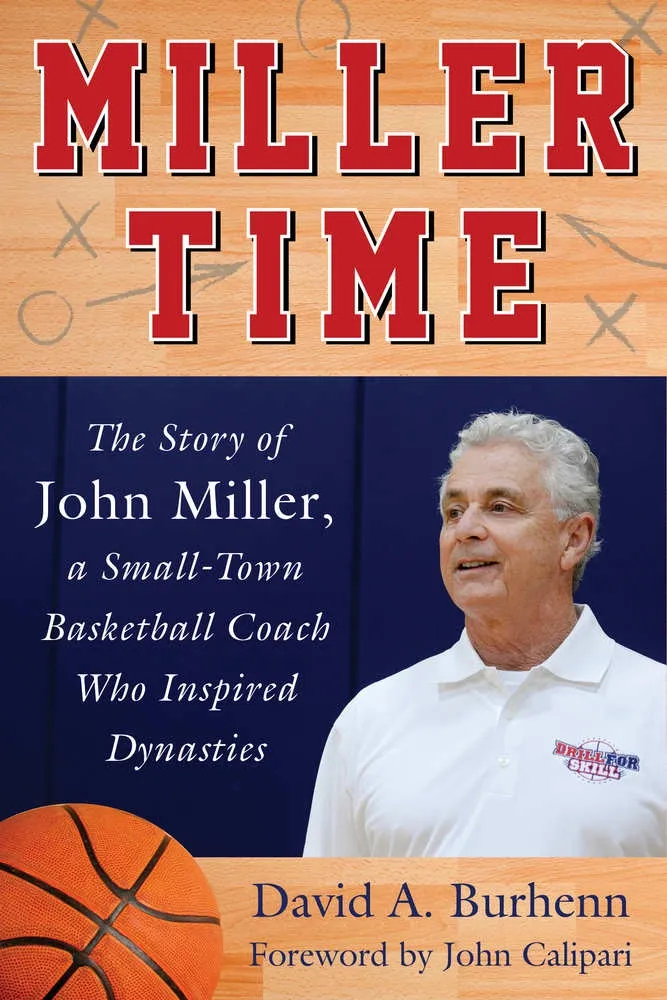
Author David A. Burhenn couldn’t have timed the spring release of his new sports biography Miller Time any better.
The 265-page account of western Pennsylvania high school coach John Miller’s coaching career, which nearly stalled after a 1-21 season at Blackhawk before Miller could right the ship and win four state titles, delves as deeply into Miller’s off-season programs that precipitated his in-season triumphs.
Out-of-staters might better recognize Miller’s coaching sons Sean (Xavier, Arizona) and Archie (Dayton, Indiana). And they probably have seen the Tonight Show footage of young Sean doing ball-handling tricks and wizardry for Johnny Carson before he went on to play at Pitt.
But Burhenn captures John Miller’s obsessive off-season devotion to player development through ball-handling and shooting drills that ultimately led to Miller’s current job, running Drill for Skill programs in an unmarked former Circuit City in Monaca.
The Miller Way, as Burhenn dubbed it, meant “putting in the hours” to be great at whatever field you chose. During the summer, Miller ran morning skills sessions for up to five hours to develop his players’ individual games, then he drove them to the worst parts of Pittsburgh in the afternoon and evenings to find the best pickup games, and to expose them to life beyond suburban Pittsburgh.
During workouts, Miller always had charts for players to fill out so they could see their progress and their efforts on paper. He was giving back tirelessly like his father had, and like a stranger had.
In essence, he was repaying a neighborhood adult proposed building a basketball hoop for the neighborhood kids to use. The boys dug the holes, showing their investment in the project. Eventually that neighbor from Ambridge (coincidentally the town that might have produced Pennsylvania’s greatest high school team in history) helped construct a full court that included lights for night basketball.
“Coach Miller’s work ethic and stamina still astonish even a workaholic like me,” wrote relative John Calipari, now the head coach at Kentucky. “His labors, though, have paid off in so many ways.”
Miller, Calipari and future Notre Dame football coach Bob Davie all parlayed childhoods at Moon Area High School into successful careers. Short in stature at 5-foot-8, Miller looked more like a middle infielder than a basketball player, but his resilience and confidence in college earned him a starting point-guard spot at Pfeiffer University in North Carolina. He and a Pittsburgh connection convinced a coach who had no plans for him to give him a chance to make the team, and before long he was starting.
That persistence paid off once Miller entered coaching.
After disagreeing with the interviewer during an interview in his quest to land a teaching/coaching gig back in Pennsylvania, standing up for what he felt a successful program would need, Miller felt he blew the interview and his chance to be a head coach. But he’d proven himself backbone-worthy to the superintendent.
Starting his high school coaching career at Riverside High, Miller made the most of limited talent each year, which impressed people in the Pittsburgh area. Still, he would never have the talent necessary to win a state title.
In the early 1970s, urban Pittsburgh expanded outward. Beaver Falls branched to the suburbs, and a new district called Blackhawk was built. State power Aliquippa wanted to hire Miller to coach the Quips, but after furloughing 20 teachers, they couldn’t justify hiring a basketball coach and giving him a teaching job.
Aliquippa had produced athletes like Mike Ditka, Pete Maravich, and Ty Law.
Instead, Miller transitioned to coaching at newly-built Blackhawk High where he’d been hired as a social studies teacher and basketball coach. He shared time in the faculty lounge with the former Blackhawk basketball coach, which strained his transition.
When four football players were privately talked in to spending the winter conditioning for football rather than playing basketball for the “new guy,” Miller’s first-year fate was sealed. The Cougars won just one game in 1977; Miller began hearing the complaints of community members.
It took some divine intervention to quell the gossip and backroom bickering. Blackhawk hired the former superintendent from Riverside, who had Miller’s back and shooshed the malcontents. And the winning ways began evolving.
In all, Miller won 657 games at Riverside and Blackhawk, most in WPIAL history. His Cougars won four state titles from 1992-1999. Miller develop players like his son Sean (Pitt) and Archie (NC State) Miller and Dante Calabria (North Carolina). His teams won with pressure half-court defense and a fast break that led to an average of 85 points per game.
Before most coaches, and because his team often lacked size, Miller utilized the three-point line early, passing inside and back out for shots for his accurate perimeter players.
In 2005 he retired from coaching, but he remains committed to his Skill for Drills.
This book should appeal to high school programs looking for a template to build a program. Miller’s obsessive devotion worked during his era, but it might not be fool-proof in modern times.
Coaches today take a risk loading kids into their cars and driving them to urban centers. And not everyone coaches under a superintendent that will fight for a coach rather than appease the selfish desires of a few parents.
Perhaps Miller’s greatest selling point for the success of his system is the development of his undersized sons as players and coaches.
That, and the life success stories of his former players who committed to a cause, then utilized those lessons to become successful beyond belief in their professional lives.

